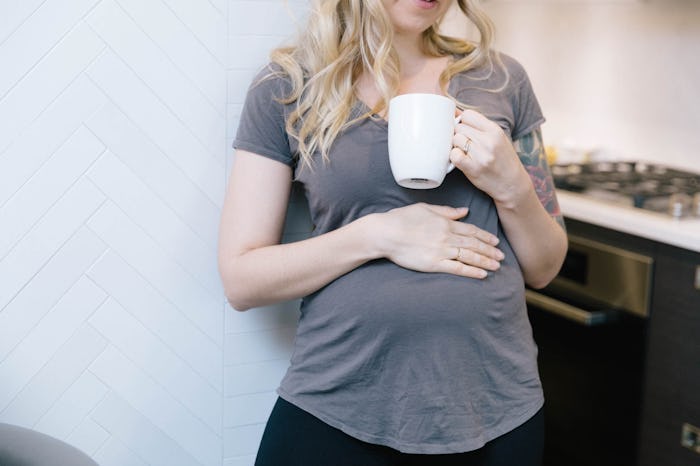Life
Here's What Science *Really* Knows About The Effects Of Caffeine During Pregnancy
If you've been pregnant for more than a minute, you've picked up on the fact that society has some serious prejudices against expectant mamas drinking coffee. And perhaps it's fair enough: When our mothers were pregnant, the standard medical advice was to completely abstain from caffeine for the entire length of gestation. These days millennial women are hearing different things from our medical providers, and most of us indulge in a serving or so a day. But should we be more concerned than we are about potential side effects? What happens if you drink caffeine while pregnant?
According to genetic counselor Beth Conover, current data indicate that moderate amounts of caffeine are unlikely to cause birth defects. "However," she clarifies, "there is conflicting data about whether exposure to large amounts in the first trimester may increase the risk for miscarriage, especially when also used with alcohol or tobacco." Conover tells Romper that another risk of drinking large amounts of caffeine in the later part of pregnancy is that it may reduce birth weight or cause the newborn to be jittery.
Conover explains that widespread medical recommendations say that consuming 200 milligrams or less per day is considered to be low risk for most women during pregnancy. However, if a woman has cause to worry about miscarriage, she might want to use extremely moderate amounts or forgo it entirely.
So is the 200 milligrams rule hard and fast? Do pregnant women need to be overly vigilant about that number? According to midwife and maternity consultant Kathy Fray, it's a matter of a woman's own discretion. While highly elevated levels of caffeine do present risk factors, no one is sure exactly what those amounts are since no research ethics committee would approve a study on how much caffeine will harm a fetus — not to mention the fact that no woman would volunteer to participate. Like practically every drug during pregnancy, Fray tells Romper the recommendations for caffeine consumption are simply based on educated hypothesis rather than proven fact.
"There are no extensive empirical 'double blind trials' that can produce conclusive hard evidence or the risks and harms," says the birth expert. "Medical science doesn't know. It can only theorize so, as usual, obstetrics has to use their 'do it in moderation' methodology. In general terms, we tell women that a couple of instant coffees a day, or one proper barista coffee a day, should be the limit while pregnant. But in the end, it’s all just a guess."
Certified Nurse Midwife Patricia Evans agrees that moderate caffeine consumption does not appear to be a contributing factor in miscarriage or preterm birth, and its alleged correlation to low birth weight is debatable.
"If you are a caffeine drinker and suddenly find yourself pregnant, it is not recommended that you stop cold turkey as this can result in withdrawal headaches," Evans tells Romper, advising instead to taper off your consumption over time. "Caffeine does cross the placenta, but these large studies have shown that caffeine does not decrease the uterine blood flow or fetal oxygenation."
Evans recommends pregnant women learn to read labels and keep track of how much caffeine they are actually consuming on a daily basis; it can be hard to tell without a standard to mentally go by. An 8-ounce cup of coffee has about 137 milligrams of caffeine, for example, and a can of soda has only about 37 milligrams. But then again, the sugar content of the soda is its own concern — often a bigger one than caffeine.
Pregnant women today have no reason to fear caffeine the way the generations before us did, but its wise to operate under some degree of moderation. If you feel like you may be drinking too much, try replacing your afternoon pick-me-up with a decaf or something healthy like a smoothie or kombucha. But don't beat yourself up for not being able to part with your morning cup of joe, because science says you don't have to deprive yourself of it. Thank goodness.
